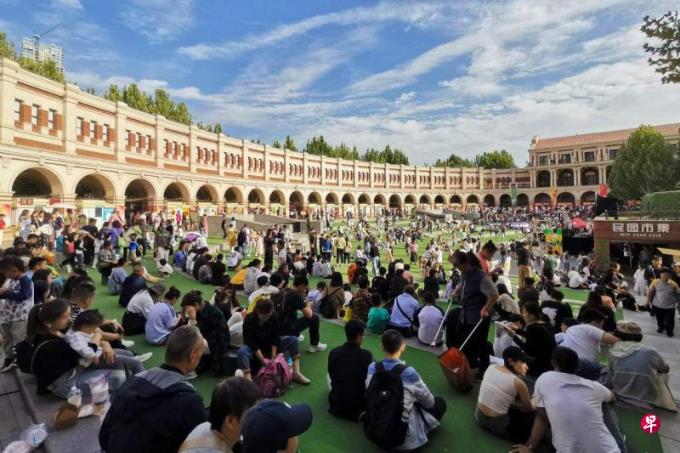
China's "Double Festival" Golden Week holiday ended. Official data show that the number of cross -border tourists has returned to 85%of the same period before the crown disease epidemic, but lower than official expectations.More Chinese consumers turn to domestic travel, and the number of tourists and consumption exceeds the level before the epidemic.
Scholars of interviewees believe that this reflects the continuous signs of China's tourism recovery, but considering the current economic and employment situation, and the relatively incomplete tourism services after the epidemic, higher -cost outbound tourism is expected to achieve comprehensive recovery. It is expected that it is still necessary to still needa period of time.
China ’s Mid -Autumn Festival this year coincides with National Day, and the public starts eight days from September 29.According to the State Administration of Immigration on Saturday (October 7), the average entry and exit personnel of the Golden Week holiday on the Golden Week reached 1.477,000, an increase of about 2.9 times compared with the same period last year, and 85.1%of the same period in 2019.This number is five percentage points lower than the official earlier expected 1.58 million.
According to the tourism platforms such as Ctrip and Tongcheng, short -range destinations in Asia, such as Thailand, Japan, and South Korea are the first choice for Chinese tourists to travel during the "Eleventh" holiday.
Yu Jiajie, who had just arrived in Vietnam and Thailand for 10 days, said in an interview with Lianhe Zaobao that he chose Southeast Asia as a tourist destination because the cost of cost was relatively high.
He said: "My budget is only about 10,000 yuan (RMB, the same below, about S $ 1900). If you want to go to Europe or a farther country, the cost is relatively high, and the itinerary must be shortened." As the recovery of overseas travel slows down, more consumers turn to domestic travel in the Golden Week.The Ministry of Culture and Tourism of China estimates that the number of domestic tourists will reach 826 million, an increase of 71.3%year -on -year, an increase of 4.1%over 2019.
According to the First Financial Report, data from multiple tourism platforms in China show that domestic travel orders in the Golden Week increased by nearly double year -on -year and 10%over May Day holidays.In addition, tourism services such as air tickets, hotels, scenic spots, and car rental have also increased significantly.
Wang Chenguang, a professor at the School of Economics and Culture and Tourism Research of Shandong University, pointed out in an interview that the recovery of China's outbound tourism is not as strong as domestic tourism. In addition to the direct factor of travel costs, the policy environment involved in the two is differentEssence
He explained that although the Chinese government has relaxed the travel agency's outbound team travel restrictions three times this year, the problems such as visas, flights, and travel agency services involved in outbound travel have not yet been resolved, which has caused resistance to outbound tourism.
He said: "The global travel agency industry has been significantly hit during the epidemic situation, and the recovery is slower than other industries. The influence of the shortage of this intermediary service on long -distance tourism is relatively large."
According to the Chinese official media Xinhua News Agency, Chinese tourists spent more than the pre -epidemic level in the 11th holiday, and achieved revenue of 753.43 billion yuan, an increase of 1.5%over 2019.
Tourism expenditure is one of the important indicators to measure China's economic vitality.China ’s tourism revenue during the May Day holiday this year only increased by 0.66%compared with the same period in 2019. It made some economic analysts worry that the domestic demand after epidemic was insufficient and the economic recovery was weak.
Wang Chenguang judged that the growth of tourism consumption expenditures in the 11th Golden Week is considerable, and the recovery of the tourism industry is more obvious.However, a small growth also means that passengers' consumption in travel is more cautious.
He said: "China’ s employment, economic situation, and per capita income level over the past year is still serious, which will definitely affect their decisions of travel consumption. "
However, Wang Chenguang believes that the Chinese tourism market structure has changed at a deeper level, and this will affect the consumption tendency of tourists.
As an example, more and more tourists who participated in the tour groups used to choose to travel freely. They prefer non -scenic spots and non -traditional tourism destinations, and pay more attention to the overall tourism quality and experience.This has led to a reduction in travel demand dominated by shopping and affecting the overall tourism consumption scale.
He said: "This is actually the optimization of the tourism structure, and it is a sign of the healthy development of the market. The spending power of these passengers may not decline, but it becomes more rational and tastes more."



